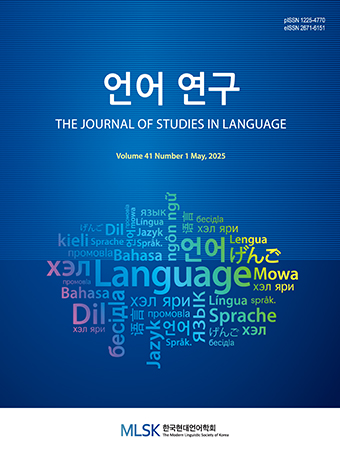Research Article
Abstract
References
Information
This study investigated differences in the use of grammar learning strategies among EFL learners’ with varying proficiency levels according to grammatical test item. The meditating effect of indirect strategies on direct strategies and grammar proficiency was also examined. Data were analyzed from 178 respondents to a closed-question survey of grammar learning strategies. Test items referred to in the survey were classified into four grammatical units: words, verb phrases, verbal phrases, and clauses. The findings can be summarized as follows: (1) There is a significant difference by level in the use of direct strategies; (2) at higher levels of proficiency, metacognitive strategies have a significant influence on proficiency; and (3) at higher levels, metacognitive strategies have a mediating effect on direct strategies and grammar proficiency in the area of verb phrases. Pedagogical implications of the findings are subsequently presented.
- YBM 편집부. 2019a. YBM English Basics Plus. 서울: YBM.
- YBM 편집부. 2019b. YBM English Basics. 서울: YBM.
- 김남희, 정미애. 2019. 영어 플립드 러닝 수업의 온라인 및 교실 수업 내 문법 학습 전략 사용과 성취도 관계. Studies in English Education, 24.3, 365-398. 10.22275/SEE.24.3.02
- 류란, 황선유. 2009. 명시적 영어문법 지도가 문법성판단시험과 학습전략에 미치는 효과. 현대영어교육, 10.3, 174-193.
- 장소영, 이성영. 2013. Rasch 측정 모형을 이용한 문법 학습전략 도구개발의 타당화 연구. 영어영문학연구, 39, 253-277. 10.21559/aellk.2013.39.4.013
- Abri, A. A., Seyabi, F. A., Humaidi, S. A., and Hasan, A. H. 2017. Grammar Learning Strategies in Omani EFL Classes: Type and Relation to Student Proficiency. Journal of Studies in Education 7.2, 151-166. 10.5296/jse.v7i2.10927
- Alsied, S. M., Ibrahim, N. W., and Pathan, M. M. 2018. The Use of Grammar Learning Strategies by Libyan EFL Learners at Sebha University. Journal of Language Teaching and Applied Linguistic 3.1, 37-51. 10.21462/asiantefl.v1i1.40
- Anderson, N. J. 2005. L2 Learning Strategies. In E. Hinkel (ed.), Handbook of Research in Second Language Teaching and Learning. Mahwah, NJ: Lawrence Erlbaum, 757-771.
- Azizmohammadi, F. and Barjesteh, H. 2020. On the Relationship between EFL Learners’Grammar Learning Strategy Use and Their Grammar Performance: Learners’ Gender in Focus. Journal of Language Teaching and Research 11.4, 583-592. 10.17507/jltr.1104.08
- Bade, M. 2008. Grammar and Good Language Learners. In C. Griffiths (ed.), Lessons from Good Language Learners. Cambridge: Cambridge University Press, 174-184. 10.1017/CBO9780511497667.016
- Bai, Z. 2018. An Analysis of English Vocabulary Learning Strategies. Journal of Language Teaching and Research 9.4, 849-855. 10.17507/jltr.0904.24
- Baron, R. M. and Kenny, D. A. 1986. The moderator-mediator variable distinction in social psychological research: Conceptual, strategic, and statistical considerations. Journal of Personality and Social Psychology 51.6, 1173-1182. 10.1037/0022-3514.51.6.1173 3806354
- Cohen, A. D. 2011. Second Language Learner Strategies. In Eli Hikel (ed.), Handbook of Research in Second Language Teaching and Learning Volume II. New York, NY: Routledge, 681-698.
- Dörnyei, Z. 2005. The psychology of the language learner. Mahwah, NJ: Lawrence Erlbaum.
- Ellis, R. 2006. Current issues in the teaching of grammar: an SLA perspective. TESOL Quarterly 40.1, 83-107. 10.2307/40264512
- Farjami, H. 2011. The effect of academic study on grammar attitude, grammar motivation and perception of grammar relevance. Modern Journal of Language Teaching Methods 1.2, 66-81.
- Ghannam, J. 2019. Enhancing Independent Learning Competence and Grammar Language Learning Strategies. In C. Goria, L. Guetta, N. Hughes, S. Reisenleutner and O. Speicher (eds), Professional Competencies in Language Learning and Teaching. Research-publishing.net, 31-40. 10.14705/rpnet.2019.34.912
- Griffiths, C. 2008. Strategies and good language learners. In Griffiths, C. (ed.), Lessons form good language learners. Cambridge: Cambridge University Press, pp. 83-98. 10.1017/CBO9780511497667.009 17669621
- Griffiths, C. 2010. Strategies of Successful Language Learners. Journal of English Language Studies 1.3, 1-18.
- McDonough, J. 2002. The teacher as language learner: Worlds of difference? ELT Journal 56.4, 404-411. 10.1093/elt/56.4.404
- Oxford, R. L. 1990. Language Learning Strategies: What Every Teacher Should Know. MA: Heinle and Heinle.
- Oxford, R. L. 2017. Teaching and researching language learning strategies. Self-regulation in context. London: Routledge. 10.4324/9781315719146
- Oxford, R. L., Lee, K. R., and Park, G. 2007. L2 Grammar Strategies: The Second Cinderella and Beyond. In A. D. Cohen, & E. Macaro (eds.), Oxford Applied Linguistics: Language Learner Strategies. Oxford: Oxford University Press, 117-139.
- Pawlak, M. 2009. Grammar learning strategies and language attainment: Seeking a relationship. Research in Language 7, 43-60. 10.2478/v10015-009-0004-7
- Sobel. M. E. 1982. Asymptoti intervals for indirected effects in structural equations models. In S. Leinhart (ed.), Sociologial Methodology. San Francisco: Jossey-Bass, 290-312. 10.2307/270723
- Supakorn, P., Feng, M., and Limmun, W. 2018. Strategies for Better Learning of English Grammar: Chinese vs. Thais. English Language Teaching 11.3, 24-39. 10.5539/elt.v11n3p24
- Tilfarlioglu, F. Y. 2005. An Analysis of the Relationship Between the Use of Grammar Learning Strategies and Student Achievement at English Preparatory Classes. Journal of Language and Linguistic Studies 1.2, 155-169.
- Publisher :The Modern Linguistic Society of Korea
- Publisher(Ko) :한국현대언어학회
- Journal Title :The Journal of Studies in Language
- Journal Title(Ko) :언어연구
- Volume : 38
- No :3
- Pages :275-290
- DOI :https://doi.org/10.18627/jslg.38.3.202211.275




 The Journal of Studies in Language
The Journal of Studies in Language






